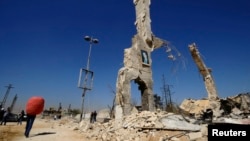I recently reached out to my Twitter followers, asking “What can I, as a VOA reporter in Washington, write about that you need/want to know?"
The responses were varied and interesting, but one topic dominated: U.S. policy in Syria. Why hasn’t the U.S. done more to help the Syrian people?
“There is lot of frustration with the Obama's administration’s ambiguous, vague and often incoherent strategy regarding dealing with Assad to stop the slaughter,” messaged London-based writer @Nehadismail.
“To put in it in context, ISIS has killed no more than 2,000 people, mostly civilians, whereas the Syrian regime has killed more than 250,000 and uprooted millions," he tweeted.
President Obama has repeatedly called for the Syrian President to step down. The U.S. has tightened sanctions on Syria, frozen assets and banned Syrian oil imports. More than once, Obama suggested that if Assad used chemical weapons against civilians, the game would change, but he held off military action even after it was proven the Syrian regime had gassed its own citizens.
In December 2013, the U.S. suspended non-lethal support for rebels in northern Syria after Islamic rebels seize some of their bases. From that point onward, the U.S. has focused its attention on the self-proclaimed Islamic State (IS) group.
Conflicting signals
When he outlined the coalition strategy against IS in September, President Obama focused heavily on Iraq. In Syria, he said, the coalition would not partner with Assad, but would instead try to strengthen the opposition so they could achieve a political solution to the crisis.
In October, U.S. envoy to the global coalition, Gen. John Allen, told London-based Asharq al-Awsat daily that getting rid of Assad was not a job for the coalition.
“What we would like to see is for the FSA [Free Syrian Army] and the forces that we will ultimately generate, train and equip to become the credible force that the Assad government ultimately has to acknowledge and recognize,” he said. “But the intent is not to create a field force to liberate Damascus.”
President Obama recently acknowledged the confusion over U.S. policy in Syria, which he called a “contradiction in a contradictory land and a contradictory circumstance.”
“We are not going to stabilize Syria under the rule of Assad, because the Sunni areas inside of Syria view Assad as having carried out terrible atrocities,” Obama told CBS’s Sixty Minutes.
“…So for a long-term political settlement, for Syria to remain unified, it is not possible that Assad presides over that entire process," the president continued.
But for now, he said, fighting ISIS was the more “immediate concern.”
During a press conference at the recent G-20 Summit in Brisbane November 16, a reporter asked Obama directly whether the Administration was actively discussing ways to remove Assad as part of efforts toward a political transition in Syria.
Obama responded in a single syllable: “No.”
In September, Congress approved a bill allocating $500 million to arm and train rebels it deems ‘moderate.’ The Pentagon announced plans to vet and train thousands of Syrian rebels, a process skeptics warned could backfire. These fears were realized earlier this month when two important rebel groups defected to Al Qaida.
Also in September, the CIA began shipping to vehicles, light weapons and other munitions that it says can be tracked. But some rebels complain that the weapons aren’t even reaching them.
Could policy change?
Recently, CNN reported that a series of meetings had been held that week to consider whether strategy should also focus on Assad.
The White House insists that there is no formal review in place, though the State Department spokesperson said the U.S. continues to “discuss ways to get to a political solution.”
“Clearly, no one is satisfied with the situation in Syria as it currently stands,” Deputy National Security Advisor for Strategic Communications Ben Rhodes told reporters at a recent briefing in Burma. “We haven’t been satisfied for years, given the loss of life there, the destabilization, the flow of refugees out of the country.”
He said the Administration would be taking a harder look at how better to fight ISIS, and would also support a transition to a new government in Damascus.
“There is a policy review underway,” said Aaron David Miller, Vice President for New Initiatives and a distinguished scholar at the Woodrow Wilson International Center in Washington, D.C.
“First of all there’s always a policy review. But this one had an edge to it; that is, it examined the practicality and feasibility of our policy, if in fact we don’t weaken Assad at the same time,” Miller said.
Miller says he understands all the arguments for removing Assad.
“It would counter the impression that we are involved in some Shia conspiracy or that we’re cozying up to Iran or that we’re leaving Assad in place and only attacking Sunnis,” Miller said. “It might help us maintain the coalition with the Turks and the Saudis who want Assad gone.”
While he doesn’t know what, if anything came out of the review, he thinks we’d know it if the Administration changed its mind on Syria.
“You’d see a lot of evidence building in favor of no-fly zones. You’d see an expansion of the CIA’s efforts to train at a faster pace. You might see air strikes against Syrian military targets,” he said.
Unintended consequences
“The U.S. got ‘spooked’ by the rise of Islamists in Egypt after Mubarak’s ouster,” said Joshua M. Landis, Director of the Center for Middle East Studies at the University of Oklahoma and editor of the blog Syria Comment.
“When we removed dictators in Iraq and Libya, we simply facilitated the rise of Al Qaida, and that’s why we have supported dictators throughout the Middle East for forty years--because we don’t want Islamists to take over.”
Landis worries that if the central state in Syria is destroyed, IS and Al Qaida rebels might overrun the cities now controlled by Assad.
“Certainly the United States would not take the risk of destroying Assad just when it is trying to fight a war against these terrorist groups,” he said.
‘Amoral policy’
President Obama has acknowledged that America has a both a "moral obligation" and a “national security interest” in ending the crisis in Syria. But at the end of the day, Aaron Miller explains the U.S. has chosen to focus on IS, not Assad, because the Islamists represent the greater threat to American interests.
“Our position on Syria is amoral; it’s not immoral,” he said.
“So how do you explain all this to the Syrians themselves?” I asked Landis, thinking of my Twitter followers.
“You can’t explain it,” he said, “because you are throwing up your hands and you are saying, essentially, ‘You started this rebellion—you’re going to have to finish it.’”







